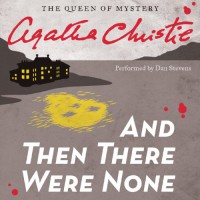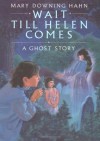Familiar Diversions
I'm a librarian who loves anime, manga, and reading a wide variety of genres.
Currently reading
And Then There Were None (audiobook) by Agatha Christie, narrated by Dan Stevens

Several people, all strangers to one another, arrive at a small, isolated island. Some believe themselves to have been invited by an old acquaintance, while others thought they were being hired by someone named U.N. Owen. All of them discover, too late, that these were lies designed to lure them into a trap. With no way to escape the island, the guests begin to die, one by one, in ways that eerily fit the "Ten Little Soldiers" rhyme.
I've only read or listened to a few of Agatha Christie's mysteries, but so far this one is my favorite, and I think Dan Stevens' narration plays a part in that. Christie's works are usually difficult for me to handle in audio - it's easy for me to lose track of characters or details - but in this case the audio format is perfect.
I had to do a double take when I looked up the narrator's name, because it never clicked for me that this was the same Dan Stevens from Downton Abbey and Disney's live action Beauty and the Beast. The man's range is impressive. There were a couple characters who sounded a little too similar for my tastes (Rogers and Dr. Armstrong, I think), but, in general, I loved his interpretations of the characters, particularly Philip Lombard and Justice Wargrave.
The first time I listened to this, the big reveal was an absolute shock. The explanation didn't quite work for me, though. I've since listened to this audiobook several more times, and my doubts about whether some of the murders were possible haven't gone away. That hasn't made And Then There Were None any less entertaining, however.
Knowing the killer's identity added another level to my enjoyment. Certain lines and bits of dialogue struck me as jaw-droppingly gutsy on Christie's part. Did she ever worry that she was being too obvious? And as for the killer, ooh, some of the things that person said and did would have required nerves of steel.
Although I loved this book overall, I also want to note that it includes both antisemitism and racism. In the version of the story used for this audiobook, the antisemitism and racism are mostly (entirely?) linked to a particular character, Philip Lombard. I interpreted them as examples of Lombard's general nastiness. I just got through reading a little about the history of And Then There Were None's publication, however, and I'm now wondering if my interpretation of those moments in the text was too charitable. No matter how much I've enjoyed the present incarnation of the story, I doubt I could have made it through the original version.
Rating Note:
My gut-level rating, the first time I listened to this, was 4 stars. I've bumped this up to 4.5 because it's been such a consistently enjoyable re-listen.
(Original review posted on A Library Girl's Familiar Diversions.)
 10
10












